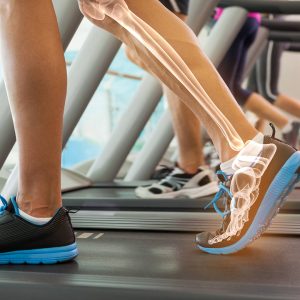How to Treat Osteoporosis

With osteoporosis, bone tissue breaks down faster than it rebuilds—causing bones to become weak and brittle—which puts you at higher risk for a fracture. This widespread bone disease can impact anyone, but women over 50 and men over 70 are at higher risk of developing osteoporosis. Despite its common prevalence, there is no cure for osteoporosis.
Thankfully, there are measures you can take to help protect and strengthen your bones. We’ll review osteoporosis treatment options, including diet and lifestyle changes and medications, so you can combat the impact of this degenerative bone disease.
Nutrition
Proper nutrition can help you prevent further bone loss to maintain and grow bone density. Be sure to incorporate these important vitamins and nutrients into your diet.
Calcium
Calcium is a major component of bones—so it’s no surprise that your calcium intake is essential to maintaining bone health. How much calcium you need depends on your age and sex. The Mayo Clinic recommends the following daily calcium intake guidelines.
- Men: Ages 19–70 – 1,000 mg, 71 and up – 1,200 mg
- Women: Ages 19–50 – 1,000 mg, 51 and older – 1,200 mg
Vitamin D
Vitamin D is an essential nutrient that helps your body absorb calcium and helps you build healthy bones. Clinical experts recommend that adults get at least 600 IUs of Vitamin D per day. While you can get Vitamin D from sunlight and food, it’s usually not enough. Consider taking a Vitamin D supplement or multivitamin to up your daily intake.
Potassium
According to the National Library of Medicine, potassium has been shown to enhance how the body processes calcium to promote bone density. You can incorporate additional potassium into your diet with foods like bananas, broccoli, lentils, milk, and yogurt.
Exercise
Not only can regular physical activity and exercise help you build strong bones, but it can also slow bone loss. Combine strength training exercises with weight-bearing and balance exercises for a dynamic exercise plan that strengthens muscles throughout your body while reducing your risk of falling.
Lifestyle Choices
While certain osteoporosis risk factors like age, sex, and genetics are out of your control, there are some factors you can change. Consider these lifestyle choices to prevent or mitigate osteoporosis:
- Reduce your caffeine and alcohol intake – consuming either in excess can reduce bone density
- Quit smoking – in addition to all the other health risks of smoking, tobacco also speeds up bone loss
Osteoporosis Medications to Slow Bone Loss
Depending on your risk for osteoporosis, your doctor might prescribe medication to stop further damage to your bone density.
Bisphosphonates
This drug works to slow bone loss—allowing bone tissue to regrow. Bisphosphonates are most commonly given to patients with low bone density in the hips and spine, with treatments lasting up to five years. You can take the medication as a pill, or your doctor can give you an injection.
Denosumab
Denosumab is used to increase bone mass and strength for patients with osteoporosis. This medication works by blocking specific receptors in the body to slow bone breakdown—preventing further bone loss while giving your bone time to rebuild. Patients receive this treatment directly from a medical practitioner with an injection every six months.
Osteoporosis Medications for Bone Growth
If you have severe osteoporosis, your doctor may prescribe medication to promote bone growth. These bone-building medications include:
- Abaloparatide
- Romosozumab
- Teriparatide
Treatments with each of these medications can span one to two years. However, the benefits of these medications disappear quickly once treatment ends, so you’ll need to continue with another type of osteoporosis medication to maintain any growth in bone tissue.
While it’s helpful to have medical treatment to assist with osteoporosis, the best medicine is preventive. Start early with proactive measures to grow and maintain strong bones: Learn more about how you can keep your bones healthy.
Osteoporosis Doctors Near Me
If you’re suffering from orthopedic pain, whether it’s caused by osteoporosis or not, contact the top-ranked bone and joint specialists at Orlin & Cohen, the region’s premier orthopedic practice. Immediate appointments are available: Request yours now.



